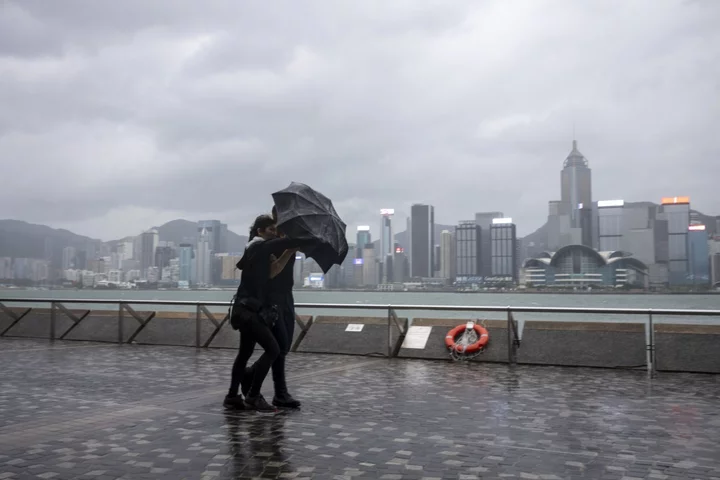
Typhoon Koinu Approaches Hong Kong With Risk of Heavy Rain
Hong Kong warned of heavy rain over the weekend as the latest forecast showed Typhoon Koinu moving closer
2023-10-06 08:55
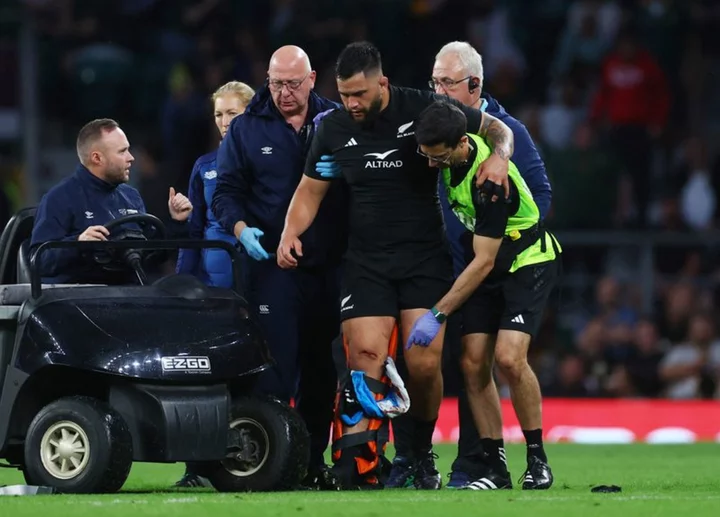
Rugby-All Blacks waiting on Lomax as 'monster game' looms
By Julien Pretot LYON, France Tyrel Lomax's return to action was cut short on Thursday as New Zealand's
2023-10-06 06:17
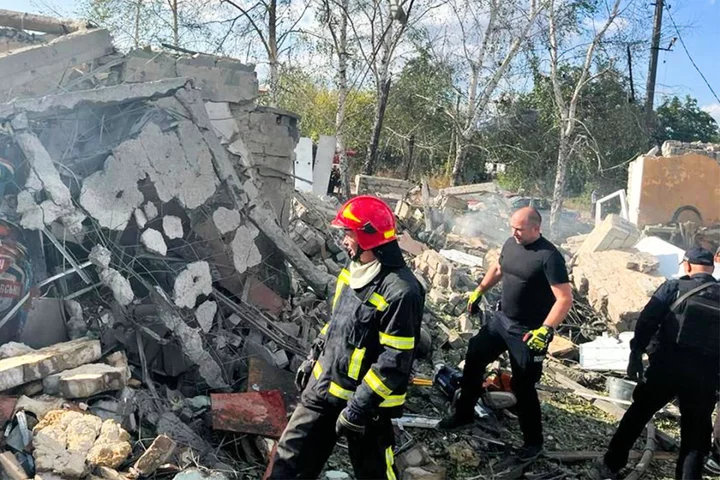
Ukraine-Russia war – live: Deadly Russian attack on memorial service was no blind strike, says Zelensky
Ukraine’s president Volodymyr Zelensky has said a Russian missile attack that killed 51 people at a memorial service was “no blind strike” and that Russian troops could not have been unaware of where they were striking. A Russian missile slammed into a cafe and shop in a village in northeastern Ukraine on Thursday, killing 51 people in Hroza village in the eastern Kharkiv region. The attack – thought to have been carried out using an Iskander ballistic missile – appears to have caused one of the biggest civilian death tolls in any single Russian strike. “One-fifth of this village has died in a single terrorist attack,” said regional Governor Oleh Synehubov. Mr Zelensky, who was attending a summit with European leaders, said: “Russian troops could not have been unaware of where they were hitting. This was no blind strike.” Separately, Russia’s Black Sea Fleet was forced into a major retreat from a Crimea port, according to the US-based Institute for the Study of War. At least 10 of Vladimir Putin’s warships retreated 237 miles to “bases further in the Russian rear” following intensified Ukrainian attacks. Read More Former Russian state TV journalist gets 8 1/2-year sentence in absentia for Ukraine war criticism Russia facing ‘functional defeat’ in the Black Sea – but Kyiv allies warn they are running out of ammunition Russia may attack civilian ships with sea mines and blame Ukraine, UK warns
2023-10-06 05:23
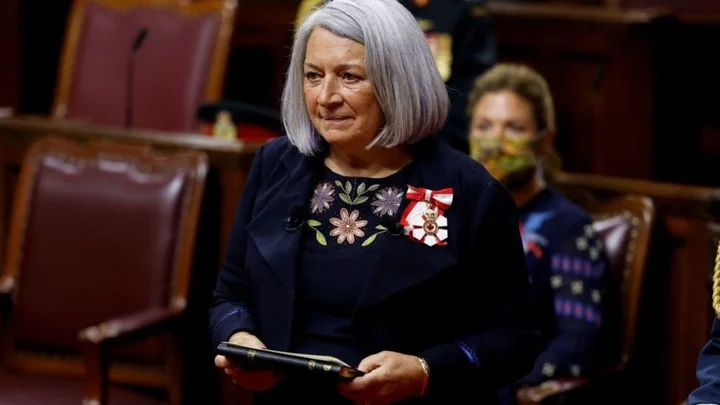
Canada Nazi row: Governor General apologises for honour given to man who fought in Waffen SS unit
The governor general's office says it regrets awarding Peter Savaryn the Order of Canada in 1987.
2023-10-06 04:52
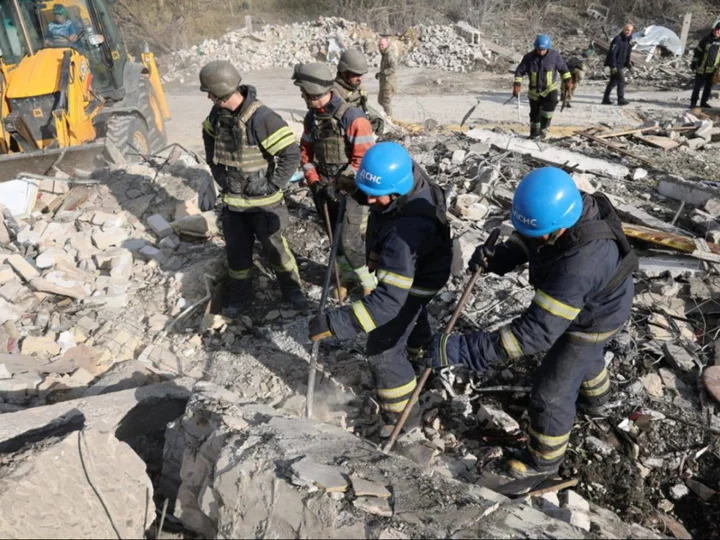
Russian missile strike kills more than 50 Ukrainians gathered for wake – in deadliest such attack in months
More than 50 people have been killed – including a six-year-old boy – after a Russian missile hit a shop and cafe in northeastern Ukraine where mourners had gathered for a wake. It is one of the deadliest such attacks since Vladimir Putin launched his invasion 19 months ago. Ukrainian President Volodymyr Zelensky, who was in the southern Spanish city of Granada for a conference with European leaders at the time of the strike, described the attack as a “brutal Russian crime” and accused Moscow of "genocidal aggression". During an emotional address to the European Political Community (EPC) in Spain, he cited the devastating impact Russian strikes were having on Ukrainian children in Kharkiv Oblast, forcing them to take school lessons in makeshift classrooms underground. A short time later officials in Kyiv said a Russian Iskander missile struck the 330-person village of Hroza in the Kharkiv region, killing at least 51, including a six-year-old boy. One image of the aftermath of the strike showed a number of bodies strewn across the floor, covered in the dust kicked up by the explosion. A handful of civilians could be seen crying behind them as two ambulance workers stood nearby. The interior minister, Ihor Klymenko, said that residents of Hroza had been holding a memorial service in the cafe that was reduced to rubble by the attack. "From every family, from every household, there were people present at this commemoration. This is a terrible tragedy," Mr Klymenko told Ukrainian television. Reacting to the strike, Kira Rudik, a leading Ukrainian opposition MP, told The Independent: “You may think that we would get used to the news of our people getting killed, but everytime it is a shock.” She reiterated the calls made by Mr Zelensky throughout the summit in Spain for more air defences and weapons from Western allies, arguing that it was essential for Ukraine “particularly to protect those places so close to the front”, such as Hroza. The village sits only around 30 miles from the nearest Russian soldiers. In recent months, thousands have fled the broader Kupyansk district, in which Groza is located, as thousands of Russian troops stage an assault of their own while Kyiv continues to push ahead with its counteroffensive further south. Mr Zelensky has visited the areas around the frontlines Kharkiv in recent days, recording a message of support for the troops battling to keep Russian forces from advancing. "The terrorists deliberately carried out the attack during lunchtime, to ensure a maximum number of casualties," Ukraine's defence minister, Rustem Umerov, said. "There were no military targets there. This is a heinous crime intended to scare Ukrainians." Mr Zelensky arrived in Spain for the European Political Community (EPC) forum on Thursday morning, meeting first with the Spanish President Pedro Sanchez before holding talks with various other leaders, including UK Prime Minister Rishi Sunak, France's President Emmanuel Macron and Italian prime minister Georgia Meloni. Though multiple issues, such as energy prices, were on the agenda for the EPC forum, the issue of supporting Ukraine was the “core” topic of discussion, according to European Commission President Ursula von der Leyen. Mr Sunak reiterated Britain's long-term support for Ukraine and said that he would be encouraging European leaders to work together to supply further defensive weapons. Both Mr Zelensky and his top aide Andriy Yermak said prior to arriving in Spain that securing new air defence systems was their top priority ahead of the winter, when Russia is expected to ramp up its missile campaign on major cities across the country. Mr Zelensky told the leaders in Granada that by providing additional military equipment to Ukraine, European countries could help ensure that a "drone, tank, or any other Russian weapon will not strike anyone else in Europe". In the wake of the attack in Kharkiv, Mr Zelensky added in a social media post: "Now we are talking with European leaders, in particular, about strengthening our air defence, about strengthening our soldiers, about giving our country protection from terror". A Spanish government source later confirmed to Reuters that Mr Sanchez had heeded that call, reporting that Spain would send both an air defence and anti-drone system to Kyiv. Ahead of the summit, German media reported that German Chancellor Olaf Scholf was reluctant to donate to Ukraine long-range Taurus missiles, despite widespread pressure from his allies to do so, over fears it would escalate tensions with Russia. The chancellor is reportedly concerned that Ukraine will use the missiles, which have a range further than the British Storm Shadows, Kyiv’s longest-range weapon to date, to hit the Kerch Strait Bridge connecting Russia to the Moscow-occupied Crimean peninsula. Mr Zelensky met with Mr Scholz on Thursday, with the two leaders discussing “working on providing Ukraine with an additional ‘Patriot’ [air defence] system for the winter months”. The meeting in Granada was also a space to shore up support for Kyiv after a weekend of political turmoil in the US. A dispute among the Republican majority in the lower chamber of the US Congress has complicated spending negotiations and prompted Democrat President Joe Biden to go from confident that a deal will be made on further Ukraine aid from Washington to openly expressing concern. Mr Zelensky admitted that there was a “political storm” over Washington but said he was “confident” that it would be resolved. “They are strong people with strong institutions, and a strong democracy,” he said. “I am confident in America.” Elsewhere, at an address in the Russian resort city of Sochi, Mr Putin accused the West of losing touch with reality over the Ukraine war. In a speech that aired many of his oft-repeated grievances against Ukraine's allies over their support for Kyiv, he also held out the possibility that Russia could resume nuclear testing for the first time in over three decades and might withdraw its ratification of a landmark nuclear test ban treaty. Read More IMF chief says the global economy has show resilience in the face of COVID, war and high rates Russia has tested a nuclear-powered missile and could revoke a global atomic test ban, Putin says Live: Karine Jean-Pierre holds White House briefing as Biden vows to stand by Ukraine
2023-10-06 01:22
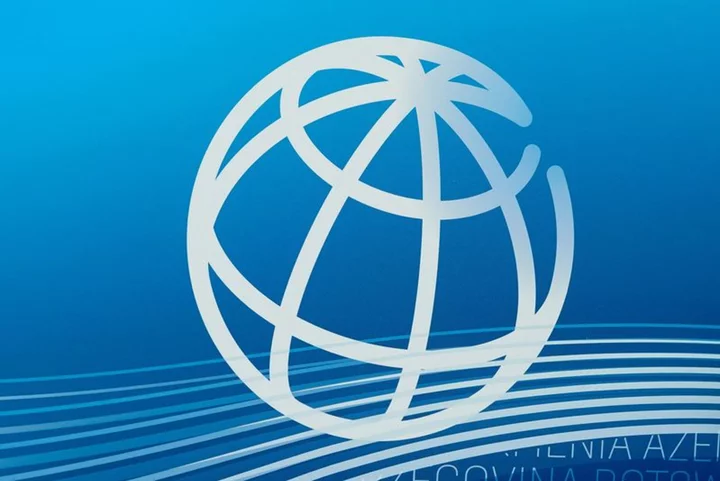
World Bank sees Saudi economy contracting in 2023, MENA growth sharply lower
By Rachna Uppal DUBAI The World Bank expects Saudi Arabia's economy to contract by 0.9% in 2023, it
2023-10-05 21:24
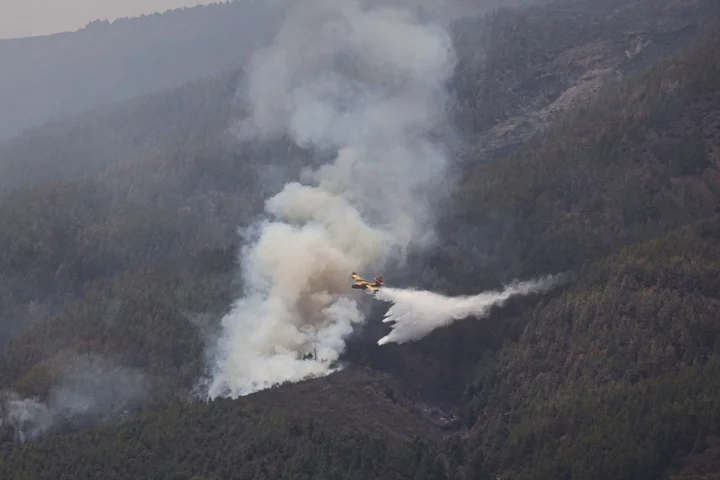
Thousands evacuated as wildfires hit Spanish tourist island
Authorities on the Spanish tourist island of Tenerife evacuated some 3,000 people from their homes overnight as a wildfire sparked by high temperatures and strong winds raged in a forested area already ravaged by fire in August. Emergency services said on Thursday on X, formerly known as Twitter, they had requested assistance from the army’s Military Emergency Unit, citing the blaze, which ignited on Wednesday, as a high level emergency. Soldiers and firefighters battled to control the fire which broke in the northeast of the island, away from the main tourist areas in the southwest. The same area suffered one of the island’s worst wildfire in decades which burned for days, destroying some 15,000 hectares (37,000 acres) of woodland within the national park surrounding the Mount Teide volcano, Spain’s highest peak. Thousands were also evacuated then, with most returning to their homes. The Canary Islands regional leader, Fernando Clavijo, told a business event in Madrid on Thursday the August fire had been brought under control but never completely extinguished, with embers still burning in the forest. He said firefighting efforts overnight had “gone well”. “There is less fuel (for the fire), so it shouldn’t get out of hand,” Clavijo said, referring to the already scorched terrain. The island, in the Atlantic off Africa’s northwestern coast, is on alert for high temperatures that are expected to reach 39 degrees Celsius (102.2 degrees Fahrenheit) throughout Thursday. Read More Spanish police reopen investigation into death of British mother in Tenerife 2023 is on track to be the hottest year ever recorded September sizzled to records and was so much warmer than average scientists call it 'mind-blowing'
2023-10-05 18:16

UK Investigates Cloud After Ofcom Eyes Amazon, Microsoft
Amazon.com Inc. and Microsoft Corp.’s cloud services face an investigation by the UK’s antitrust watchdog over concerns the
2023-10-05 17:47

80-year-old Russian woman found to have lived her whole life with needle in brain
Doctors found an 80-year-old woman in Russia has lived her entire life with an inch-long needle in her brain. A local radiologist discovered a three-centimetre needle inside the octogenarian’s brain during an X-ray scan, said the Ministry of Health in Sakhalin in a Telegram post on Wednesday. The tiny needle was located in the parietal lobe of the unnamed woman’s brain, according to the ministry. While it did not disclose the exact date of discovery, it said the needle was found this year. The needle was lodged inside her brain since she was born. Doctors believe she had survived a failed infanticide attempt by her parents. In the Soviet era during the famine of the 1930s, desperate parents struggling with poverty would insert a needle into the soft spot of a baby’s head – the fontanelle – where the skull hadn’t entirely developed. It would then close, obscuring the needle, but the newborn would eventually die. “Such incidents were not uncommon during the years of starvation: a thin needle would be inserted into a newborn’s fontanel to damage the brain,” the local health department of the remote Russian region wrote on its Telegram channel. “The fontanelle quickly closed up, covering up evidence of the crime, and the baby died.” Such an attempt, believed to have been carried out on the woman who was likely born around 1943, did not lead to the intended effect. The woman had, however, occasionally complained of headaches. While doctors have decided against surgery to pull the needle, fearing it could harm the patient, “her condition is being monitored by primary care physicians”, said the ministry’s statement, adding that she was not at risk. Sakhalin is an island of 50,000 people located 6.5km off the southeastern coast in Russia and 40km of north Japan’s Hokkaido. Its control was split between the former Soviet Union and the then Japanese Empire in 1905, following a war between the two sides. The Soviet Union had seized the Japanese portion of the island in the final days of the Second World War in 1945. Read More ‘Alive and wriggling’ parasitic worm removed from brain of Australian woman Dog thought to have a brain tumour turns out to have a 7cm needle stuck in neck Pope links plight of Ukrainians today to Stalin's 'genocide' The Body in the Woods | An Independent TV Original Documentary The harrowing discovery at centre of The Independent’s new documentary
2023-10-05 16:20

Metro Bank Hires Morgan Stanley to Explore Capital Raise
Metro Bank Holdings Plc has hired Morgan Stanley to explore a potential capital raise after it faced pushback
2023-10-05 15:55
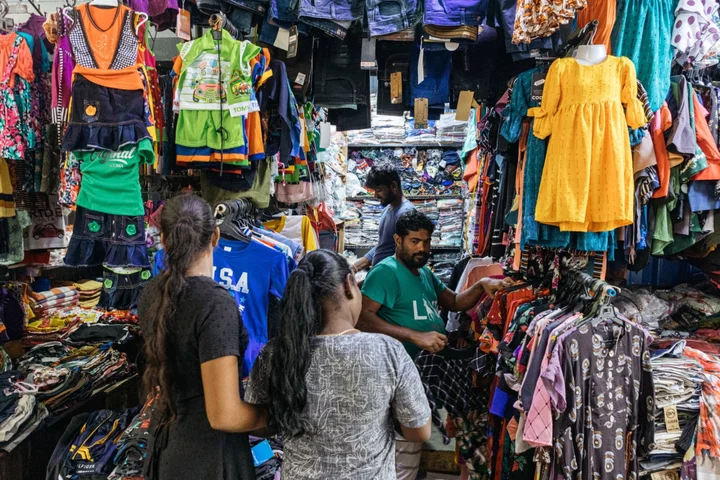
Sri Lanka Cuts Rate to Revive Growth as Inflation Cools
Sri Lanka cut its benchmark rate for a third time this year to help revive economic growth and
2023-10-05 14:25
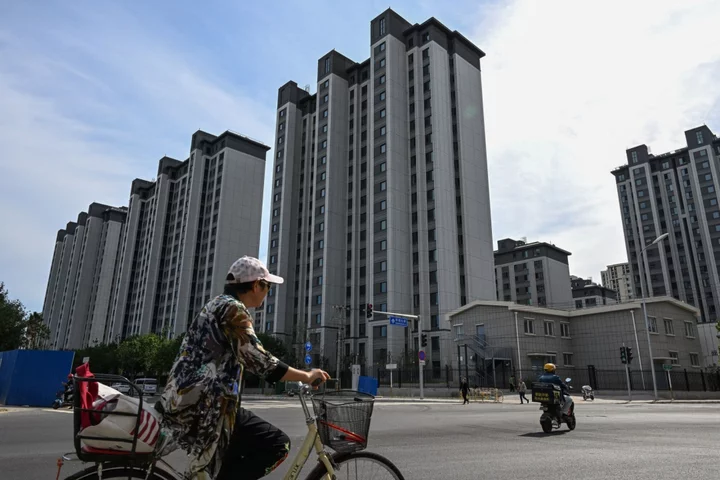
Sunac Wins Court Approval for Offshore Debt Restructuring
Sunac China Holdings Ltd. won court approval for its multibillion-dollar offshore debt restructuring plan, clearing the last key
2023-10-05 14:22
